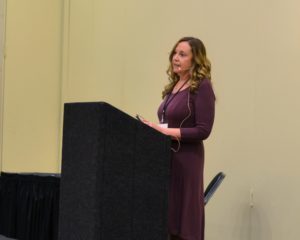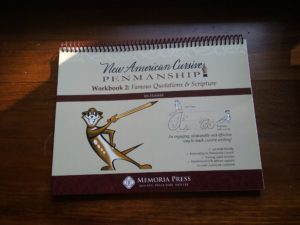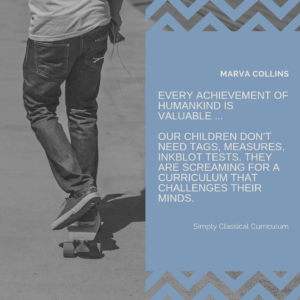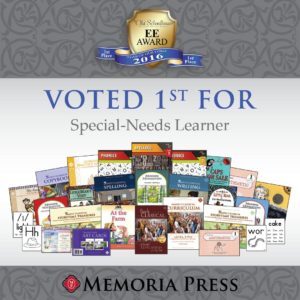Cheryl Swope's Blog, page 3
April 7, 2020
Cheryl Swope, Virtual Conference, April 16-18, 2020
I LOVE the ease of online conventions! Sign up for any session(s) you would like.
Enjoy from your own home. No travel, no hotel costs, no fuss. Just one hour of your time to connect and refresh.
I’m offering four different topics from the comfort of my home in Missouri:
Classical Christian Education: Beautifully Defined
What Good Are Labels? Unraveling the Puzzle of Your Struggling Child
Classical Education for Special Needs & Struggling Learners
10 Reasons Your Homeschool May Be the Best Place for a Child with Special Needs
Read full descriptions of sessions here.
See you soon!
…
Cheryl Swope, M.Ed., author of Simply Classical: A Beautiful Education for Any Child (2nd edition, Memoria Press, 2019) and the award-winning Simply Classical Curriculum for Special Needs (Memoria Press, Voted #1 for Special Learners 2014, 2016, 2018, 2019). With a master’s degree in special education, Cheryl holds lifetime K-12 state teaching certifications in learning disabilities and behavior disorders. She has served in public and private schools, but learned the most humbling lessons homeschooling twins with special needs.
Missouri natives, Cheryl and her husband of nearly thirty years adopted boygirl twins and homeschooled the children from the twins’ infancy through high school graduation. Both twins have autism, learning disabilities, and severe mental illness (schizophrenia). Now young adults, their enduring love of literature, history, music, and Latin inspire Cheryl to share the hopeful message that a classical Christian education offers benefits to any child.
We invite you to sign up for the free magazine/catalog, Simply Classical Journal, with encouraging articles and homeschooling resources for children with special needs.
Cheryl Swope, founder and author, ClassicalSpecialNeeds.com, from Memoria Press
March 26, 2020
Classical Christian Education: Simply Defined
Our definition shared here for you:
“A classical Christian education is a formative education designed to incline the student to that which is true, good, and beautiful through the liberal arts and sciences, guided by the great literature, art, music, and ideas of all time, and enfolded by the Holy Scriptures with the merciful assurance of Jesus Christ as our all-sufficient sacrifice for sin and the eternal fulfillment of truth, goodness, and beauty for us.” — Cheryl Swope
Read Simply Classical: A Beautiful Education for Any Child (expanded, updated 2nd edition; Memoria Press, 2019).
(c) Cheryl Swope. All Rights Reserved.
A reading from the New Testament:
Therefore, having been justified by faith, we have peace with God through our Lord Jesus Christ, through whom also we have access by faith into this grace in which we stand, and rejoice in hope of the glory of God. And not only that, but we also glory in tribulations, knowing that tribulation produces perseverance; and perseverance, character; and character, hope. Now hope does not disappoint, because the love of God has been poured out in our hearts by the Holy Spirit who was given to us.
For when we were still without strength, in due time Christ died for the ungodly. For scarcely for a righteous man will one die; yet perhaps for a good man someone would even dare to die. But God demonstrates His own love toward us, in that while we were still sinners, Christ died for us. Much more then, having now been justified by His blood, we shall be saved from wrath through Him. For if when we were enemies we were reconciled to God through the death of His Son, much more, having been reconciled, we shall be saved by His life. And not only that, but we also rejoice in God through our Lord Jesus Christ, through whom we have now received the reconciliation. — Romans 5:1-11, emphasis added
SimplyClassical.com
Instagram @_simplyclassical_
Image by Jeff Jacobs from Pixabay
March 25, 2020
Free Virtual Conference March 26-28, 2020
We cannot meet in person this conference season, but we can meet online!
From my home in Missouri this Thursday-Saturday, March 28-28, 2020, we invite you to FREE one-hour sessions with Q&A.
No recordings. “Live” only. Learn more here.
March 26 @ 5:30 p.m. EDT
Classical Christian Education: Beautifully Defined
Cheryl Swope
For all of its popularity, there must be more than stages, rote memory, and the ancients, right? Have you ever heard what is at the heart of a classical education? Hear simple explanations to unpack key words that will delight the newcomer, challenge the skeptic, and remind those in classical education why you began doing this in the first place.
March 27 @ 11:30 a.m. EDT
10 Reasons Your Homeschool May be the Best Place for a Child With Special Needs
Cheryl Swope
Homeschooling offers key advantages to struggling students and children with special needs. Discover why your home school may be the best possible choice for your child. Learn how to make your homeschool even stronger.
March 28 @ 8:30 a.m. EDT
Classical Education for Special Needs & Struggling Learners
Cheryl Swope
We often think of classical education for highly verbal children, but what about children with dyslexia, autism, adhd, or intellectual disability? Does a classical education have anything to offer such children? Hear answers from a mother with a master’s degree in special education, who homeschooled her adopted twins (autism, specific learning disabilities, and mental illness) “K-12” with a classical education.
March 28 @ 4:00 p.m. EDT
What Good Are Labels? Unraveling the Puzzle of Your Struggling Child
Cheryl Swope
Learn how to unravel the mystery of your child’s difficulties. Hear why an accurate, thorough diagnosis and treatment plan can change everything for your child. Time for Q&A will be provided.
Cheryl Swope is the author of Simply Classical: A Beautiful Education for Any Child and creator of the award-winning Simply Classical Curriculum for Special Needs (Memoria Press). SimplyClassical.com.
Thou wilt keep him in perfect peace, whose mind is stayed on thee: because he trusteth in thee. Isaiah 26:3
March 18, 2020
Suddenly Home: Your Family during the Coronavirus
We know the sanitization recommendations and plan to follow them. But what about families who find themselves suddenly homeschooling?
As schools close or move to online classes, we offer families a few tips:
Create a Vision
How do you want your children to remember the coronavirus? How do you want your children to remember the ways you handled the challenges? Talk about this! Choose a family motto with hope and comfort. Post, frame, or memorize this. Consider my daughter’s confirmation verse, which we often reference in difficult times: Fear not, for I am with you; be not dismayed, for I am your God; I will strengthen you, I will help you, I will uphold you with my righteous right hand (Isaiah 41:10).
Create a Space
Your children will need a good work space. Designate an area free of auditory distractions (no radio, tv, needless chatter, or phone). Minimize visual distractions by placing in the work space only those items necessary for working (sharpened pencils, student materials by subject). By establishing a work space, you convey respect for the child’s vocation as a student and communicate the presumption that work time will be spent working. If you need materials, shop by grade. If you need something to occupy little ones while older students work, consider this award-winning preschool package for 2s and 3s. (No writing required. Just cozy little lessons for little people, 30 minutes a day.)
Create a Routine
Set expectations. Let children know that they are to be up, dressed, and ready to begin at a set time each day. Begin the day with an inspiring reading, hymn, or prayer to set the tone. If possible, tackle hardest subjects first with a view to finishing those by noon. In between provide brief “wiggle” breaks with jumping jacks, stretches, marching in place, or toe touches before resuming work. After lunch, complete the lighter or more enjoyable subjects. Conclude your work day with something enjoyable — singing together, taking a walk, or playing a rousing board game or backyard soccer.
To pass the time memorably in the evenings, start family read-alouds. If you have multiple ages at home, select a series that can span wide age ranges, such as the Chronicles of Narnia, or choose any of the books within these carefully selected Read-Aloud sets.
Listen to this 14-minute podcast for more quick tips for families who find themselves suddenly home due to covid19.
Blessings to all —
Cheryl
Image by Rudy and Peter Skitterians from Pixabay
February 17, 2020
Fine-Motor Skills & Special Needs
For some children, coloring seems natural and engaging. For others, fine-motor skills need help!
This afternoon a homeschooler asked how to help her son. This was my response:
You may do any or all of the following to help him:
1. Pre-outline
Before he sees the page, outline his written work. Use a thick black marker to help him see the boundaries.
2. Teach Hand-Over-Hand
Write with him hand-over-hand when needed. This assists muscle memory as you write top-to-bottom, left-to-right, with proper pressure on the page.
3. Color Side-by-Side
Color side-by-side, as if you are a team. “I’ll color the girl. You color the boy.” Or “Let’s color this one together. I’m going to color the hat brown. What color will you make his shirt?” Play gentle instrumental music during coloring time if that would help. Think of this time as contemplative, engaged, shared art-therapy, as well as the lesson itself.
4. Go 3-D
Use cut-out sandpaper letters, magnetic letters, playdough letters, or Wikki sticks to provide him with matching 3-D letter forms.
5. Measure Progress
If you want to see progress, use a ruler to measure how far he colors or draws outside of the lines. See where the measurement lies currently. It might be 1″, 3/4″, 1/2″, or 1/4″. Work on lessening this distance over time. Cheer him on. Remeasure as you go.
6. Go Sensory
Set aside a 9×9 pan of cornmeal, rice, or sand for tracing letters with an index finger prior to writing. Hand-over-hand, trace the letter form in proper order, top to bottom, to imprint the form in his mind.
7. Allow Tracing
Sometimes allow index-finger tracing of letters, rather than writing. Do this when he is fatigued or when you anticipate undue frustration. If he is more advanced than the index-finger approach, allow tracing paper. Tip: Then mark “Traced” with a star on the page. This avoids the blank page and lets him know that he completed this page AND that you approved this.
8. Use Your Simply Classical Curriculum Manual
Implement the many fine-motor/pre-writing suggestions at the front of your Simply Classical Curriculum Manuals to improve fine-motor strength and dexterity in your child’s free time. If you are not familiar with these, explore our Simply Classical Curriculum via the link.
9. Consult OT
Consult an Occupational Therapist (if you haven’t already) for ways to boost your child’s fine-motor coordination.
10. Play
Make fine-motor work, such as board games (little tokens to move), Lego play, crafts, or puzzles, part of your everyday afternoon and evening family time.
Need individualized help? Email cherylswope@memoriapress.com.
If you feel especially ambitious, a mother of a little girl with Down syndrome suggested this on our Simply Classical forum:
I’m using the raised-line kindergarten paper Cheryl recommends in one of the levels. I used a highlighter to draw five circles (essentially capital Os) on each line. Then, I used a colored marker to make a dot at the top of each. We also counted them and I wrote the numbers inside each O. She traces 5 Os each day. Nothing more. Just five. I’m taking the approach that five circles/Os done every day with very little to no resistance is better than a full page of anything. We’ll move onto vertical lines, horizontal lines, diagonal lines, capital Us, and upside down Us over time. My goal is to help her learn to control her fine movements to get closer and closer to the actual shape. Right now I’m holding loosely the tip of the marker (the fat Crayola washable markers) for stability. After we get good with the marker and the ease with which it glides on the paper, I’d like to use crayons (a bit more resistance), and then pencils/colored pencils for even more resistance/sensory input.
Most of all, know that you are not alone in these struggles with writing! Perseverance in these early years is the key.
For many of our students with special needs, intellect outpaces fine-motor skills. Even so we believe that the fine-motor work is beneficial neurologically and cognitively, with or without adaptations. Just give yourself permission to experiment and enjoy the therapeutic aspects of the work together!
Thanks-
Cheryl
Cheryl Swope, M.Ed.
Special Needs Coordinator
Memoria Press
SimplyClassical.com — Simply Classical resources, curriculum, community
Disclaimer:
Any information provided in this article is general information about medical and educational conditions and treatments. The information is not advice, and should not be treated as such. The educational and medical information is provided “as is” without any representations or warranties, express or implied. Cheryl Swope and Memoria Press make no representations or warranties in relation to the information given in this email. You must not rely on the information given in any of these email conversations as an alternative to medical advice from your doctor or individualized advice from any other professional healthcare or educational provider. If you think you or your child may be suffering from any medical condition you should seek immediate medical attention. You should never delay seeking medical or educational advice, disregard medical or educational advice, or discontinue medical or educational treatment because of any information provided in articles by Cheryl Swope or Memoria Press.
Photo courtesy of Alicja, Pixabay
January 23, 2020
Happy National Handwriting Day!
We love celebrating writing!
Today only, save 15% on all handwriting materials from Memoria Press.
This includes our unique Simply Classical Handwriting Lesson Plans. Order from sales@memoriapress.com with promo code 20nhd15%.
Tip: Beginning students will need 1) New American Cursive 1 and 2) Simply Classical Individual Writing Plans from Level 2.
With the friendly assistance of this friendly Meerkat, we include New American Cursive in our Simply Classical Curriculum packages. NAC is based on research to assist all students including those who are left-handed, reluctant writers, developmentally delayed, or dysgraphic.
Read the “Top Ten Reasons to Learn Cursive” from handwriting expert and Simply Classical friend, Iris Hatfield.
See all of our Simply Classical Spelling, Penmanship, and Writing programs for struggling students and students with special needs.
How will YOU celebrate??
#penmanship #newamericancursive #handwriting #dysgraphia #raisingwriters
December 30, 2019
Homeschooling a Child with Dyslexia or Dysgraphia
Tips for Homeschooling a Student with Dyslexia or Dysgraphia
1. Provide Therapies
Begin or continue any necessary or prescribed therapies, such as occupational therapy for dysgraphia.
2. Make Adaptations
Give yourself permission to adapt standard teaching resources, such as those from Memoria Press:
a. Use discussion rather than required writing and accept oral responses to questions in the student guides.
b. Relax the pace as needed to provide additional review before marching on.
c. Conduct more pre-reading help, such as identifying difficult words to decode or reading comprehension questions ahead of the text.
3. Teach Study Skills
Teach study skills as its own subject: learning how to study, take notes, identify main ideas, highlight important information, make flash cards, prepare for tests, and review cumulative knowledge.
4. Enjoy Audio Books or Read Alouds
Obtain high quality audio versions of texts too difficult to read, in part to save your own voice if you are accustomed to reading for or with him. Encourage him to follow along in the text with the audio version, if that helps him. If he needs to replay any difficult section, he can do so with an audio version. If he struggles with auditory processing or attention difficulties on his own, consider read-alouds.
5. Streamline Days and Years
Teach fewer subjects at once. Consider trimesters or two standard semesters and a lighter summer course.
6. Tutor One-on-One with Proven Methods
Identify his weaker academic areas and intensify instruction in them. Usually this includes writing, spelling, and reading. Rather than merely accommodate for weak areas, use the advantages of 1:1 or small group instruction within homeschooling (or hire a tutor) to give him the skills and knowledge he will need in these key areas. Unsure how to teach? See our Simply Classical resources in writing, spelling, Latin, or complete full-year packages as needed.
7. Teach from Both Lower Levels and Higher Levels
Use slightly lower levels of materials whenever needed to teach writing, reading, or spelling. Do not worry about the “grade” assigned to any resource. Choose higher levels of materials if he can manage them, and then adapt for his specific learning disabilities as described above. Whatever he needs — tutorial writing, higher science, math, or history; and slightly lower literature, perhaps — can become his full course of study.
8. Encourage His Gifts
Identify his true talents, gifts, and interests, whether within academics or in other areas (not video games). Nurture and support these when studies are completed. Homeschooling allows the freedom for this! Give him with time for nature, hiking, photography, art, mechanical or musical pursuits through outside courses, practice, time for independent study, or all of the above.
Your student with dyslexia and/or dysgraphia must grapple with the difficult areas of reading, writing, and spelling to build knowledge, skills, and discipline. But also encourage him in the areas in which he truly shines.
Voted #1 for Special Learners through the OldSchoolhouse Magazine in 2019 for the fourth year, the Simply Classical Curriculum is ready to serve you.
Read the encouraging book, Simply Classical: A Beautiful Education for Any Child , 2nd edition (Memoria Press, 2019). “If you are all out of HOPE, you need this book!” – Heidi
Score the free Simply Classical placement tests for your student or watch the video “Where Do I Start?“.
May we send you our catalog? Arriving free to your mailbox twice a year with articles, tips, and resources: Simply Classical Journal
December 10, 2019
Boys’ Book List
Looking for a way to ignite a love of reading for a boy on your Christmas list?
In the Essential Boys’ Book List, my Memoria Press colleague, Martin Cothran, gives you gift ideas for boys of all ages.
If you need resources to teaching a struggling reader, see our Simply Classical Curriculum with everything you need to begin!
Bonus Gift: Any order from Memoria Press before December 31, 2019, receives a free copy of the picture book, The Three Questions, a beloved tale from Leo Tolstoy, while supplies last.
Bonus Podcast: How do you choose books to read with a child who is developing at a different rate than his or her peers? Cheryl Swope, author of Simply Classical: A Beautiful Education for Any Child and mama to twins with special needs, gives you what you need to know in this episode of the Read-Aloud Revival podcast. Learn:
about the benefit of reading aloud with kids with special needs
how to choose books
Cheryl’s advice for parents starting out
“In the case of good books, the point is not to see how many of them you can get through, but rather how many can get through to you.” – Mortimer J. Adler
photo credit: Image by Anatoly777 from Pixabay
Girls’ Book List
Looking for a way to spark the imagination of your favorite girl?
This Essential Girls’ Book List gives you gift ideas for girls of all ages.
Looking for more than a single book? Our complete Simply Classical Read-Aloud Packages give you an instant home library!
Bonus Gift: Any order from Memoria Press before December 31, 2019, receives a free copy of the picture book, The Three Questions, a beloved tale from Leo Tolstoy, while supplies last.
Bonus Podcast: How do you choose books to read with a child who is developing at a different rate than his or her peers? Cheryl Swope, author of Simply Classical: A Beautiful Education for Any Child and mama to twins with special needs, gives us the lowdown in this episode of the Read-Aloud Revival podcast. Learn:
about the benefit of reading aloud with kids with special needs
how to choose books
Cheryl’s advice for parents starting out
“In the case of good books, the point is not to see how many of them you can get through, but rather how many can get through to you.” – Mortimer J. Adler
photo credit: Image by Jonny Lindner from Pixabay
November 4, 2019
Teaching Children with Special Needs
Is better to teach children with special needs from an integrated curriculum designed for children with special needs? Learn why curricular cohesion provides inherent repetition, delight, and mastery for children with special needs.
The Simply Classical Curriculum gives children from ages 2 and up the oral language, written language, reading, arithmetic, science, history, and eventually even Latin necessary for an excellent education.
Whether you need only a handful of materials or everything required for a full year, we can help. We believe that we must do better than a laissez faire approach to teaching children with special needs. We believe that we must do better than a mere life-skills-only approach to teaching children with special needs.
We give you the materials, the daily lesson plans, and the customer service with community to help you and your student(s) thrive.
“In some circles the word “curriculum” is anathema. It is far better, this thinking asserts, to take a relaxed approach to education, to teach a la carte.” After all, we must not be dogmatic….(keep reading)
Questions? Contact sales@memoriapress.com or cherylswope@memoriapress.com.
Cheryl Swope's Blog
- Cheryl Swope's profile
- 8 followers













